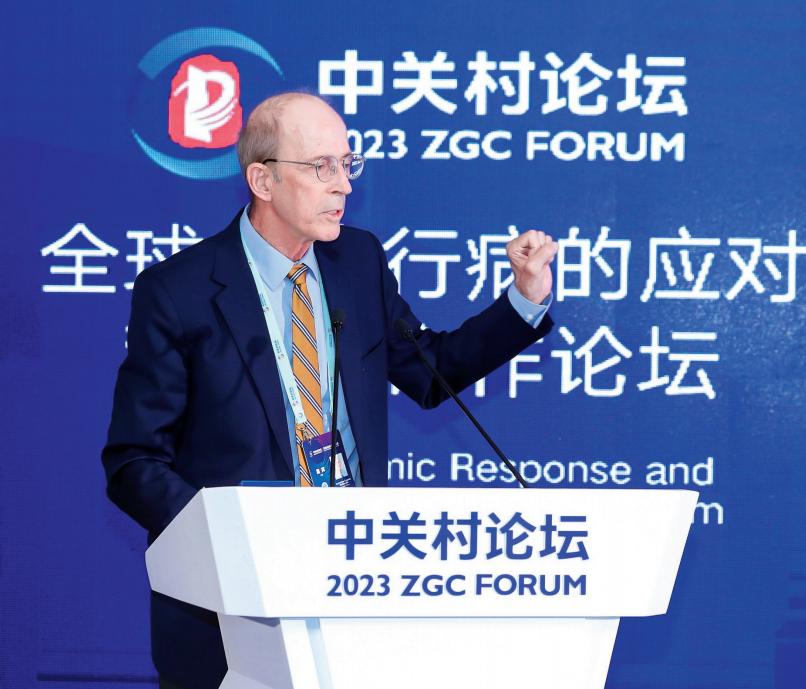Expert's Map of Chinese Vaccine History

Dr. Lance Everett Rodewald speaks on 2023 ZGC Forum.(PHOTO: International Talent Magazine)
By GAO Shudi & LONG Yun
Dr. Lance Everett Rodewald is an internationally recognized expert in immunization programs. Before becoming a long-term immunization program supporter in China on June 2012, he had a career leading immunization services at the US-CDC. After finishing his work at WHO and retiring in May 2018, the Chinese Center for Disease Control and Prevention (China CDC) appointed him as a senior advisor on the national immunization program.
"I love China, and I love my mission, [and] my work. It's nice to be in a team at the China CDC where people value each other and work together," he said.
An Asset for the country and its people
China's immunization program has come a long way, evolving and advancing over the years. "China's immunization program is an asset to the country and an even greater asset to the people," said Rodewald. As a leading expert in the field of public health and vaccination, he has been particularly impressed by the national roll-out of the hepatitis B and measles vaccines in China, commending the country's achievements in disease prevention and control.
One of the most significant achievements of China's immunization program is to reduce hepatitis B virus infection in children. This accomplishment can be attributed to the national immunization program's childhood hepatitis B vaccination, which has been instrumental in addressing the incremental problem. Rodewald emphasizes the importance of administering the hepatitis B vaccine to infants on the first day of life, which as a strategy has been diligently implemented in China. As a result, this generation has experienced a significant decline in hepatitis B infections, effectively conferring almost lifelong immunity against the disease.
Measles, another major concern for China's immunization program, witnessed a remarkable transformation after the introduction of the measles vaccine. Prior to the vaccine's implementation, measles was widespread among children in China. However, with the advent of the Live attenuated Vaccine of Measles in 1965, the nation saw a significant decline in measles cases. This success can be attributed in part to the high coverage and vaccination rates achieved through China's immunization program, ensuring that every child has access to necessary vaccines.
Rodewald praises China's immunization program for its ability to achieve high coverage and vaccination rates, a feat that many countries struggle to accomplish. This widespread accessibility to vaccines has contributed to the program's effectiveness in improving the quality of life for the population.
An Unbreakable Connection
In 2012, Rodewald embarked on a life-changing journey as he set foot in China for the first time. His mission was to work hand in hand with Chinese experts and scholars to promote China's immunization program. Little did he know that this journey would become an inseparable part of his life. His wife, Patricia, shared the same passion for China and decided to accompany him on this adventure.
She has volunteered for years to provide expert consulting services and technical support at the National Museum and the Palace Museum and has been teaching at the Central Academy of Fine Arts since 2022.
Rodewald's love for China is not just a matter of professional obligations, and it extends far beyond that. He carries a "map of China's vaccine history" in his mind, a testament to his extensive travel and work in various regions of China. Every place he visited, every endeavor he undertook, and every interaction he had with the locals contributed to the creation of a profound connection with the land.
Beyond his work-related activities, Rodewald embraced the Chinese lifestyle, taking time to explore the natural beauty of the country. Riding around Qinghai Lake with friends became one of his favorite pastimes, allowing him to immerse himself in China's stunning landscapes. Additionally, he witnessed the remarkable results of poverty alleviation efforts in Ruyang County, a poverty-stricken county.
When the world faced an unprecedented challenge with the onset of the COVID-19 pandemic, he never hesitated to help out his Chinese colleagues. Regardless of weather conditions, he rode 28 kilometers to and from work every day, working tirelessly to prevent and control the spread of the virus.
This article is in cooperation with International Talent Magazine.







